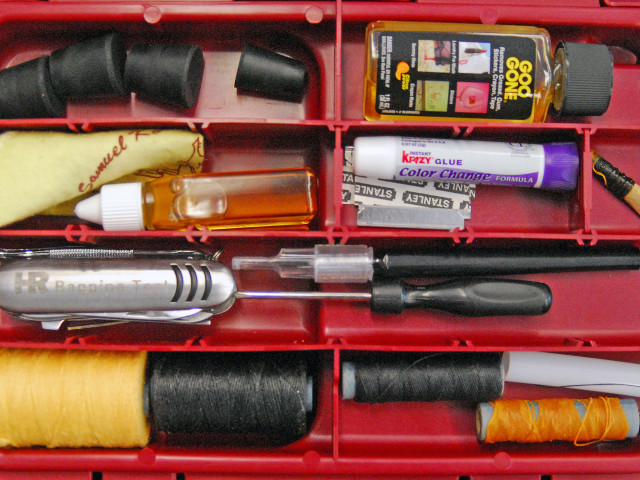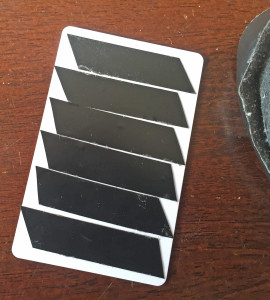
If you’re like me, your pipe case is packed to the gills with stuff. But when do you really need it all? Most tinkering on the bagpipes takes place in the practice room, at home, by yourself. Over time, a single piper can accumulate quite a collection of piping accouterment. I’ll be honest, I am prepared for lone piping survival after the apocalypse. I carry it all. But how often do I really pull out that spare gear, reed, tool, thing…all of which is weighing down my pipe case? Answer: almost never. I can think of one time over a long time when I dropped my blowstick on a contest day, ruining my flapper valve, and was happy I had: a) an extra flapper; and b) my tools including small needle nose pliers. All went well. New flapper installed and crisis averted. Luck favors the prepared. And that is the point. You never know what you need until you need what you don’t have. Predicting that though is going to be different for every bagpiper. Some will put their mind at ease and carry around a separate toolbox stocked to the brim with tools, extra reeds, and everything else short of a circular saw. Others get by with a small pipe-case sized box of emergency items. Whichever path you choose, listing a bunch of stuff that may or may not belong with you at all times would be tedious. Let’s instead think about the classification of your gear. Your essential items should generally fall into four separate categories:
Maintenance and repair
Sound production
Music making
Physical health
Stock your bagpipe case with at least one item that lines up in each category, and you will be set for just about anything.
MAINTENANCE AND REPAIR. These items are what you need to take care of all conditions the bagpipe might face (emergency or otherwise) and spare equipment for keeping the instrument up and running. Think of what you will be doing at any time, what might happen, and collect a tool that can help you do that. What might happen? Sudden cracks, loose hemp, excess moisture, bag leakage. The right tool for the right job. Think swabs and brushes. Hemp and wax. Cutting tools. Tie cord. Hose clamps. Electrician’s tape.
SOUND PRODUCTION. This equipment includes those things that are responsible for making pleasing sounds. Spare drone reeds. Dental elastic for reeds. Reedsmithing tools. Extra moisture control stuff. Spare blowstick or flapper valve. Spare seasoning.
MUSIC MAKING. Extra music-making equipment will be those items that help you produce your final musical product. Spare, working chanter reeds contained safely. A backup chanter. Deburring or Dremmel tool. Chanter tape.
PHYSICAL HEALTH. Always include items that help you physically get through your play, anticipating possible afflictions. Think Tylenol, Rolaids or other antacids. First aid. Granola bars. Sweat towel. Small bottle of hydrating liquid.
Over time and with experience, you will discover what “essentials†you should always have on hand and which items to pack for special excursions. The items in each of these categories will be different for everyone and might change constantly. Download a handy table (click here for the Pipehacker Gear Essentials) to concoct your own list and keep your essential gear organized.

The modern competitive bagpiper can become quite the connoisseur of hotel rooms and beds. International competition and even the local US circuit will have a piper and his or her gear on overnight stays all year long. It’s a safe bet that many pipers will have their favorite hotel that features regularly in their travel plans. You’ll end up with an impressive collection of rewards points for sure. Inevitably, you’ll also end up with an impressive collection of plastic hotel room key cards. One or two will always appear in your sporran at the end of a trip. I don’t have the nerve to toss them because I know I can find a repurposed use for them—sustainable living, you know. (Extra tip: they serve as excellent paint scrapers.) Because this is Pipehacker, there is indeed a repurposed use for these credit card-sized pieces of plastic that will serve your bagpiping needs. Here is a quick and simple tip/project that will provide you with a ready supply of tape for tuning the notes on your pipe chanter. All you need is a dead key card, a hobby knife, and a roll of tune tape.
A word about what is typically sold as “tune tape.” While this vinyl tape is a de rigueur part of a modern bagpiper’s supply kit, the large, 1/2-inch roll one gets at your favorite bagpipe supply shop is not suited for constant storage in one’s pipe box. Here is my roll after many hot US piping seasons bouncing around in my pipe case.
One roll is a lifetime supply, but not if that roll is a loose, gummy mess. The solution is to have a supply of tape at the ready while keeping the roll at home, safe from further abuse.
How to Do It
Pull off a strip of tune tape. Stick along the top of the key card.
Cut the tape on an angled cut with an Xacto knife or other blade near the edge of the card.
Stick that new end underneath the first strip, cut the end again and repeat down the length of the card. You should end up with 6 strips.

A reason to keep hotel keys! Flip the card over and repeat the same steps on the other side. Fill other cards if you have them.
The cards are a sturdy holder for ready-cut pieces of tape for use on your chanter. No fumbling or cutting needed. One card will hold twelve strips, enough for each hole on your chanter with extra. The tape should stay flat and undamaged wherever you keep it. The card fits perfectly in your sporran or the pocket of your waistcoat, but it could just as easily find a place in your pipe case. Keep the full roll of tape at home, safe and sound. Resupply the cards as needed as the strips are used.